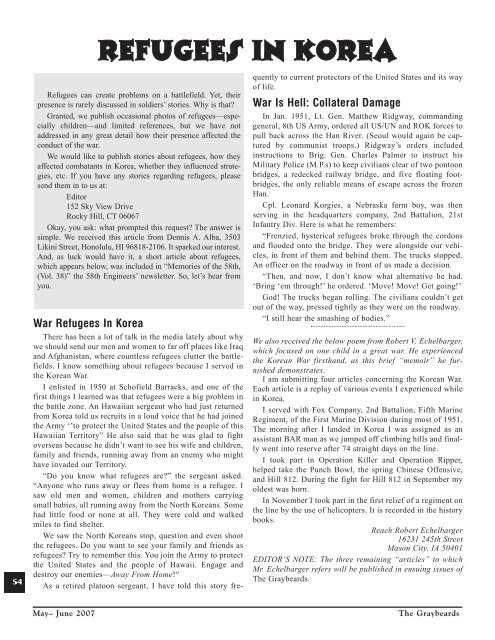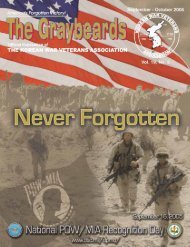2007 KWVA Election Results - Korean War Veterans Association
2007 KWVA Election Results - Korean War Veterans Association
2007 KWVA Election Results - Korean War Veterans Association
Create successful ePaper yourself
Turn your PDF publications into a flip-book with our unique Google optimized e-Paper software.
Refugees in Korea<br />
54<br />
Refugees can create problems on a battlefield. Yet, their<br />
presence is rarely discussed in soldiers’ stories. Why is that?<br />
Granted, we publish occasional photos of refugees—especially<br />
children—and limited references, but we have not<br />
addressed in any great detail how their presence affected the<br />
conduct of the war.<br />
We would like to publish stories about refugees, how they<br />
affected combatants in Korea, whether they influenced strategies,<br />
etc. If you have any stories regarding refugees, please<br />
send them in to us at:<br />
Editor<br />
152 Sky View Drive<br />
Rocky Hill, CT 06067<br />
Okay, you ask: what prompted this request? The answer is<br />
simple. We received this article from Dennis A. Alba, 3503<br />
Likini Street, Honolulu, HI 96818-2106. It sparked our interest.<br />
And, as luck would have it, a short article about refugees,<br />
which appears below, was included in “Memories of the 58th,<br />
(Vol. 38)” the 58th Engineers’ newsletter. So, let’s hear from<br />
you.<br />
<strong>War</strong> Refugees In Korea<br />
There has been a lot of talk in the media lately about why<br />
we should send our men and women to far off places like Iraq<br />
and Afghanistan, where countless refugees clutter the battlefields.<br />
I know something about refugees because I served in<br />
the <strong>Korean</strong> <strong>War</strong>.<br />
I enlisted in 1950 at Schofield Barracks, and one of the<br />
first things I learned was that refugees were a big problem in<br />
the battle zone. An Hawaiian sergeant who had just returned<br />
from Korea told us recruits in a loud voice that he had joined<br />
the Army ‘’to protect the United States and the people of this<br />
Hawaiian Territory” He also said that he was glad to fight<br />
overseas because he didn’t want to see his wife and children,<br />
family and friends, running away from an enemy who might<br />
have invaded our Territory.<br />
“Do you know what refugees are?” the sergeant asked.<br />
“Anyone who runs away or flees from home is a refugee. I<br />
saw old men and women, children and mothers carrying<br />
small babies, all running away from the North <strong>Korean</strong>s. Some<br />
had little food or none at all. They were cold and walked<br />
miles to find shelter.<br />
We saw the North <strong>Korean</strong>s stop, question and even shoot<br />
the refugees. Do you want to see your family and friends as<br />
refugees? Try to remember this. You join the Army to protect<br />
the United States and the people of Hawaii. Engage and<br />
destroy our enemies—Away From Home!“<br />
As a retired platoon sergeant, I have told this story frequently<br />
to current protectors of the United States and its way<br />
of life.<br />
<strong>War</strong> Is Hell: Collateral Damage<br />
In Jan. 1951, Lt. Gen. Matthew Ridgway, commanding<br />
general, 8th US Army, ordered all US/UN and ROK forces to<br />
pull back across the Han River. (Seoul would again be captured<br />
by communist troops.) Ridgway’s orders included<br />
instructions to Brig. Gen. Charles Palmer to instruct his<br />
Military Police (M.P.s) to keep civilians clear of two pontoon<br />
bridges, a redecked railway bridge, and five floating footbridges,<br />
the only reliable means of escape across the frozen<br />
Han.<br />
Cpl. Leonard Korgies, a Nebraska farm boy, was then<br />
serving in the headquarters company, 2nd Battalion, 21st<br />
Infantry Div. Here is what he remembers:<br />
“Frenzied, hysterical refugees broke through the cordons<br />
and flooded onto the bridge. They were alongside our vehicles,<br />
in front of them and behind them. The trucks stopped.<br />
An officer on the roadway in front of us made a decision.<br />
“Then, and now, I don’t know what alternative he had.<br />
‘Bring ‘em through!’ he ordered. ‘Move! Move! Get going!’<br />
God! The trucks began rolling. The civilians couldn’t get<br />
out of the way, pressed tightly as they were on the roadway.<br />
“I still hear the smashing of bodies.”<br />
We also received the below poem from Robert V. Echelbarger,<br />
which focused on one child in a great war. He experienced<br />
the <strong>Korean</strong> <strong>War</strong> firsthand, as this brief “memoir” he furnished<br />
demonstrates.<br />
I am submitting four articles concerning the <strong>Korean</strong> <strong>War</strong>.<br />
Each article is a replay of various events I experienced while<br />
in Korea.<br />
I served with Fox Company, 2nd Battalion, Fifth Marine<br />
Regiment, of the First Marine Division during most of 1951.<br />
The morning after I landed in Korea I was assigned as an<br />
assistant BAR man as we jumped off climbing hills and finally<br />
went into reserve after 74 straight days on the line.<br />
I took part in Operation Killer and Operation Ripper,<br />
helped take the Punch Bowl, the spring Chinese Offensive,<br />
and Hill 812. During the fight for Hill 812 in September my<br />
oldest was born.<br />
In November I took part in the first relief of a regiment on<br />
the line by the use of helicopters. It is recorded in the history<br />
books.<br />
Reach Robert Echelbarger<br />
16231 245th Street<br />
Mason City, IA 50401<br />
EDITOR’S NOTE: The three remaining “articles” to which<br />
Mr. Echelbarger refers will be published in ensuing issues of<br />
The Graybeards.<br />
May– June <strong>2007</strong><br />
The Graybeards

















